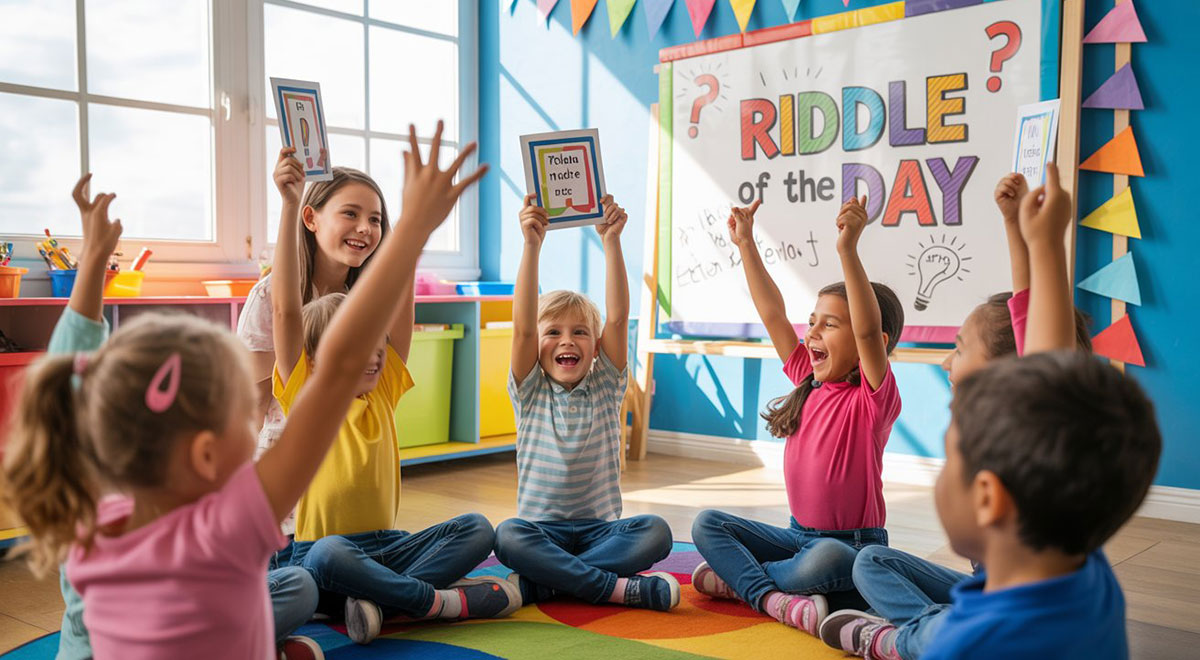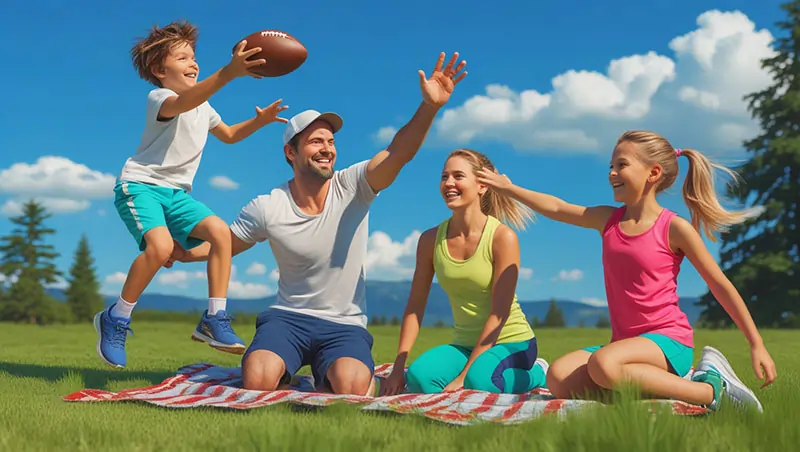Funny Riddles to Make Your Day Better: Learn and Laugh Together
Listen, I’ll be honest with you: riddles have always been around, but the amusing ones? They feel different. You sit there trying to figure it out, and then all of a sudden you start laughing at yourself for not seeing it sooner. That’s where the magic is. A well-timed riddle can save the day, whether you’re attempting to keep kids busy on a rainy day or break the ice at a party.
Why jokes make puzzles more enjoyable
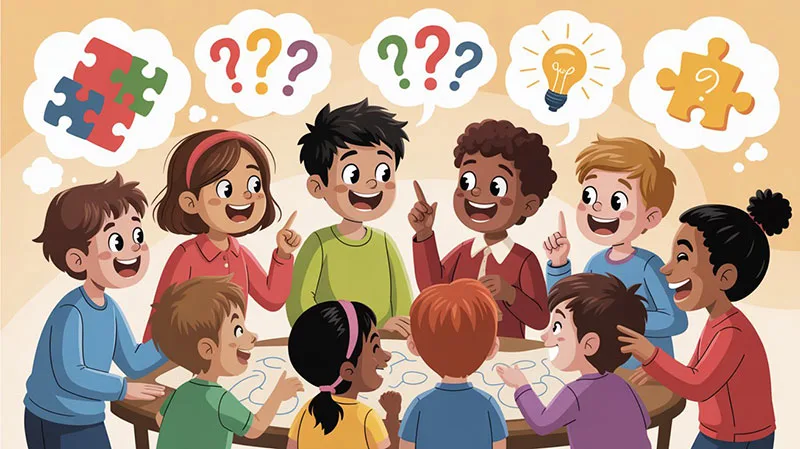
When you hear a funny riddle, your brain does something strange. You’re waiting for the response, going through the options, and maybe even second-guessing yourself. Then, BAM, the punchline hits, and you either laugh or groan (let’s be honest, sometimes groaning IS laughing).
Humor makes things that are hard easier. You don’t know it, but when you’re having fun, you’re really exercising your brain hard. Kids don’t care if they’re “learning” while they’re laughing at goofy word games. They’ll remember a silly riddle for years, but they’ll forget their schoolwork from the day before.
Scientists have really looked into this. Your brain releases dopamine, a neurotransmitter that makes you feel good and helps you remember things, when something makes you laugh. That’s why I can still tell idiotic jokes from third grade but couldn’t remember where I placed my keys this morning.
And here’s the thing: exchanging riddles brings people closer together. You all work together to figure it out, groan at awful puns, and have those “OH I GET IT NOW” moments. The memories of those shared encounters last a lot longer than the riddle itself.
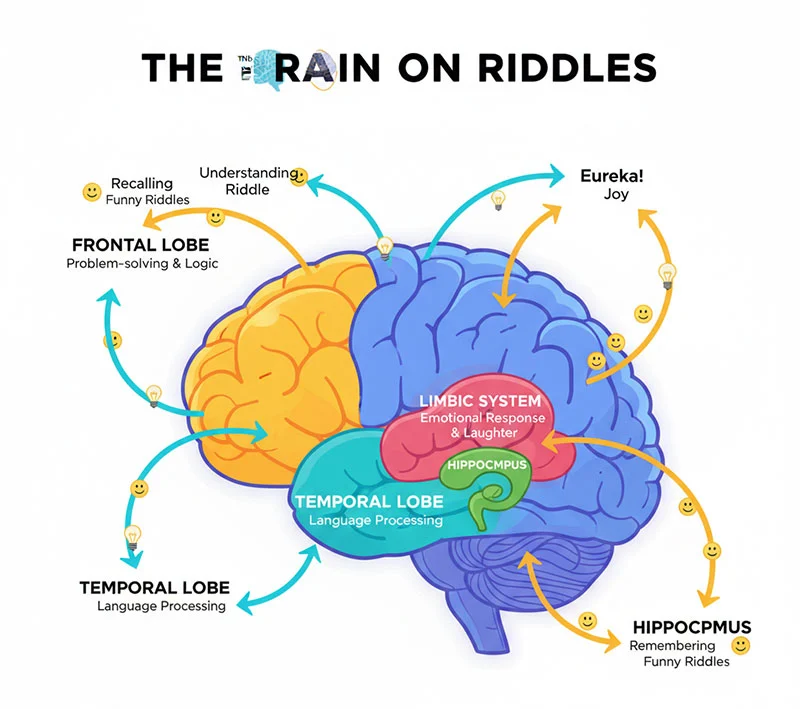
The 10 Funniest Riddles for Everyone
Okay, here are my favorite riddles that almost always work:
Riddles that are easy and fun
1. What do you call a bear that doesn’t have any teeth?
A bear made of gum!
2. What caused the bike to fall?
It was too exhausted!
3. What has hands but can’t clap?
A clock!
4. What kind of room doesn’t have windows or doors?
A mushroom!
5. Why don’t scientists believe in atoms?
Because they are the building blocks of everything!
6. What do you name a fish with a crown?
A fish with a crown!
7. When I’m young, I’m tall, and when I’m old, I’m short. What am I?
A candle!
8. What is brown, has a head and tail, but no legs?
A penny!
9. The more you take, the more you leave. What am I?
Steps!
10. What gets wetter as it dries?
A towel!
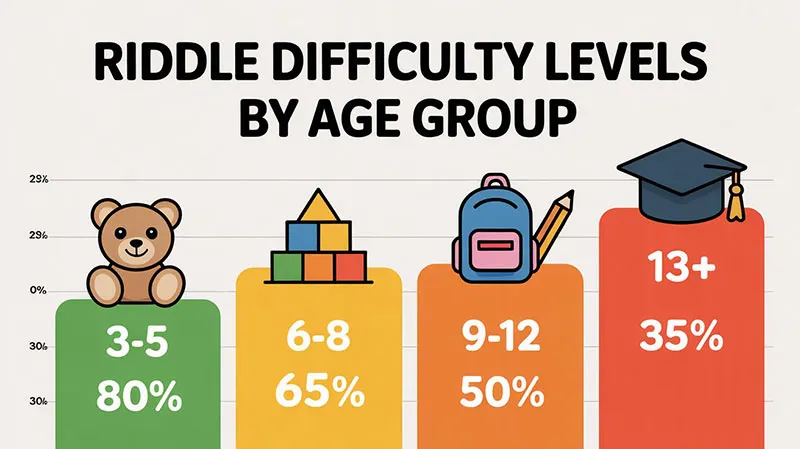
How Laughter Can Help You Learn
| Benefit | How It Works | Impact on Learning |
| Stress Reduction | Laughter lowers cortisol levels | Creates a relaxed mental state optimal for information absorption |
| Memory Enhancement | Humor triggers emotional engagement | Information paired with emotion is stored more effectively |
| Attention Span | Funny moments re-engage wandering minds | Breaks up monotony and refreshes focus |
| Social Connection | Shared laughter builds rapport | Encourages collaborative learning and peer teaching |
| Motivation Boost | Fun activities increase enthusiasm | Students actively seek out learning opportunities |
I’ve seen this happen a lot: kids don’t even know they’re doing hard work when they’re laughing and learning at the same time. Their brains are linking “this is fun” and “this is hard,” which is honestly the best thing you could wish for.
The other big thing? When you laugh, you don’t have to be afraid of messing up. The kid gets the riddle wrong, and everyone laughs with them, not at them. All of a sudden, failure isn’t so scary anymore. It’s just part of finding things out. That change in thinking is huge and lasts throughout their education.
This is something that adults need as well. When we’re having fun, our brains operate better, but we forget that when we’re “serious” learning. Riddles that make us laugh remind us that learning doesn’t have to be a chore.
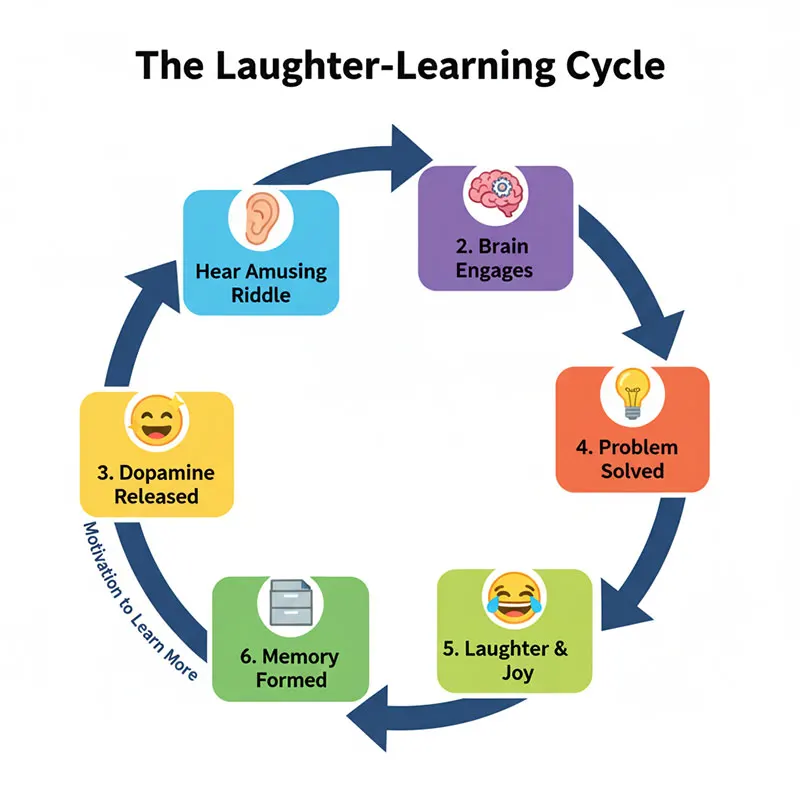
How to Use Riddles to Help You Talk to People Better
Riddles are a sneaky way to get better at talking to people. You need to talk properly, listen carefully, and think about what you’re saying. These are all important abilities that go beyond merely delivering jokes.
How to Make Your Ideas Clear
Try telling a riddle but leaving out one important word. Doesn’t work, right? You learn quickly that the details are important and that the way you say things matters. Kids that tell riddles all the time learn how to put their ideas in order before they spoke. They start to wonder if the person they’re talking to will really get what they’re saying.
Getting Better at Active Listening
If you merely half-listen, you won’t be able to solve a puzzle. You need to pay attention to every word and think about how they can have more than one meaning, sound the same, or be tricky in the way they are written. If you do this enough, you’ll start to notice things in everyday discussions that you used to miss.
Improving Your Questioning Skills
What questions do you ask when you’re stuck on a riddle? What information is important? This helps you learn how to ask better questions in real life, including at work, at school, or anywhere else you need to gain information from someone.
Connecting Different Cultures
Riddles are quite cultural. They depend on strange language, shared allusions, and shared experiences. When someone from a different background offers a riddle you don’t comprehend, it starts a full discourse about how people think in various ways. It’s interesting to figure out why something is clear to one individual but not to another.
Riddles and Fun Ideas for the Classroom
Things to do in the classroom
Brain Warm-Up for the Morning: The first thing you do is write a riddle on the board. Kids who figure it out early aid their friends. The fast thinkers become leaders, while the slower thinkers get aid from their classmates as well as the teacher. Win-win.
Riddle Writing Challenge: Ask your kids to create up riddles around what you’re learning. Class on science? Riddles about space. What is history? Riddles about famous people from the past. They are learning the topic better because they need to grasp it well enough to make a puzzle out of it.
Riddle Relay Races: Work together to solve a riddle to get to the next one. The first team to get through all of them wins. This is great for classes that are overly hyperactive. They are moving around and thinking hard at the same time.
Mystery Riddle Box: All week, kids put riddles in a box. On Friday, the whole class works together to answer them. It gets kids excited and allows shy kids a means to be involved without putting themselves out there.
Fun Things to Do at a Party
Riddle Scavenger Hunt: The answer to each riddle tells you where to look for the next clue. The last riddle tells you where to find the treasure (or the cake, to be honest).
Team Riddle Competition: Teams compete, but you can’t only give points for correct answers. Make sure everyone gets a chance to win by having categories like “Best Wrong Answer” or “Silliest Riddle”.
Riddle Karaoke: Instead of singing, folks act out riddles in a funny way. The overacting makes everything funny, especially when someone truly gets into the scene.
Make Your Own Riddle Station: Get everything you need to make riddle cards. Kids make their own to take home. They can be used as both party favors and activities.
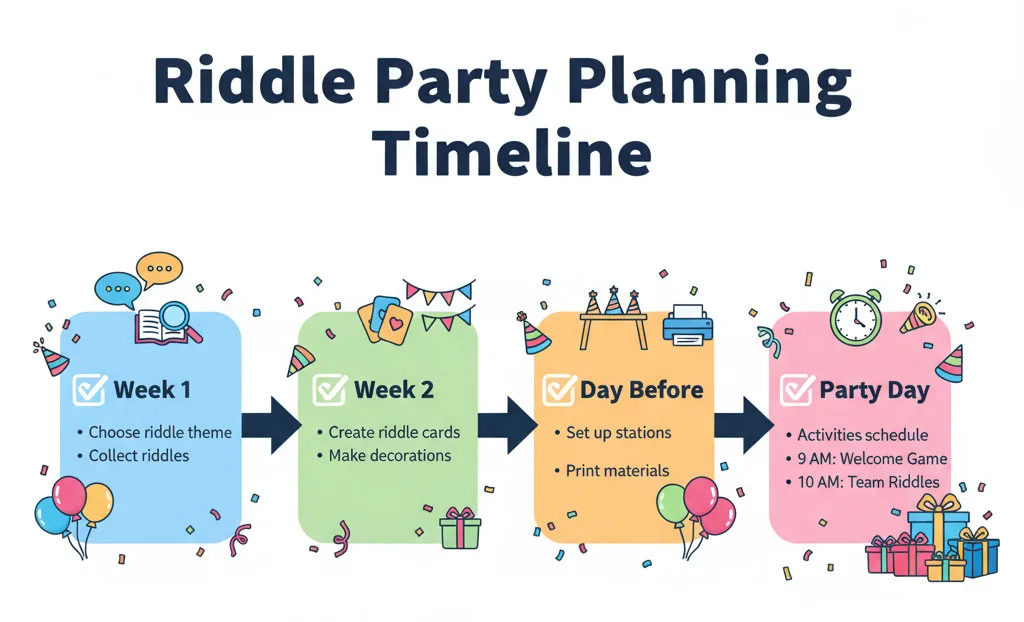
Common Questions About Funny Riddles
Q: At what age should kids start learning riddles?
A: Even three-year-olds can figure out really easy riddles. Things like “What says moo and gives milk?” You can give them harder ones as they get older and better at language. Just make sure the riddle is appropriate for their level of development.
Q: How do riddles help the brain grow?
A: Riddles make your brain work in a lot of different ways at once. You have to use language, find patterns, think outside the box, and remember things. It works out your mind like a full exercise. Regularly doing it will make those brain circuits stronger.
Q: Do riddles help students who have problems learning?
A: Yes, really. The funny portion takes some of the stress and pressure off. The framework (question, time to consider, answer) makes it apparent what you want to do. Some kids like different types of riddles, so talk to their teachers to find out what works for them.
Q: How many riddles should I give out at once?
A: Three to five is usually the best number. People start to zone out after that. Choose decent riddles instead of merely listing a dozen that aren’t very good.
Q: What if someone doesn’t find a riddle funny?
A: Humor is personal. It’s okay if not everyone thinks the same things are humorous. Try out different kinds of jokes, such puns, logic puzzles, and absurdist comedy, until you find one that works for your audience.
Q: Is there different sorts of riddle comedy in different cultures?
A: Yes, of course. Riddles often rely on language traits or cultural knowledge that don’t work in other languages. But that’s actually wonderful because it makes for fun talks about language and how people think in different ways.
Q: How can I recall riddles so I can repeat them later?
A: Write them down in your phone’s notes or a little notebook. Sort by kind or level of difficulty. Look at them from time to time; doing so will help. Eventually, you’ll have a lot of them memorized and ready to go.
Conclusion
Funny riddles do more than merely pass the time. They make you think, pull people together, and make learning something you want to do. They can help teachers wake up a tired class. Parents can use them to spend time with their families. They can make a dull moment more fun for anyone. The best part? You don’t need anything out of the ordinary. No planning, no apps, no gear. You only need your brain and a desire to play with words and ideas. You can tell riddles anywhere: while you’re stopped in traffic, waiting at the doctor’s office, sitting around the dinner table, or trying to fall asleep at night.
Today is the day to start collecting riddles. Tell everyone. When others get them wrong, laugh. When the punchline is bad, groan. Watch how these little bits of fun stretch out and make everything a little better. Every riddle you post is a chance to connect with someone, teach them something, or just remind everyone that thinking can be fun.
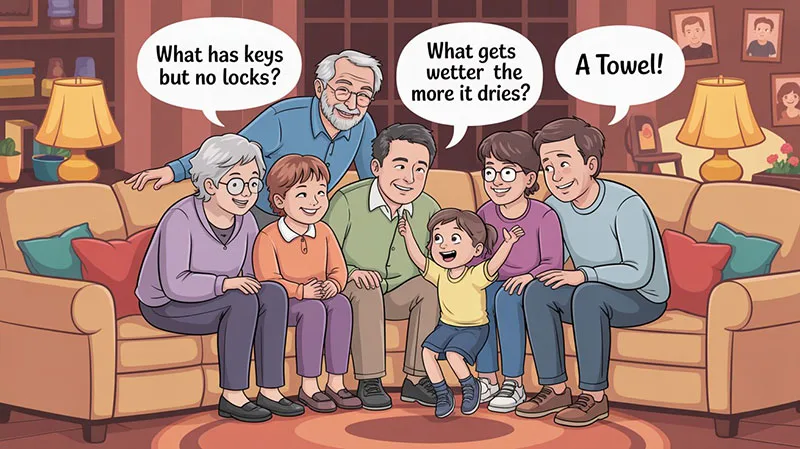
Here is a basic collection sorted by who they work best for:
🎯 Guide to Categories:
- Preschool (3–5 years old): Easy, straightforward riddles with clear answers
- Elementary (Ages 6–10): Word games and logic puzzles that are not too hard
- Tweens and teens (ages 11 and up): hard riddles that need lateral thinking
- All Ages: Riddles that everyone can enjoy together
- Seasonal: Riddles that are based on holidays
- Educational: Riddles that are based on a certain subject to help you learn
💡 Usage Tips:
- Print these puzzles on colored card stock
- Laminate them to make them last longer
- Make a riddle jar for your family and pull one out at supper every night.
- Use them to spark conversations on lengthy flights.
- Try to remember three new riddles every week.
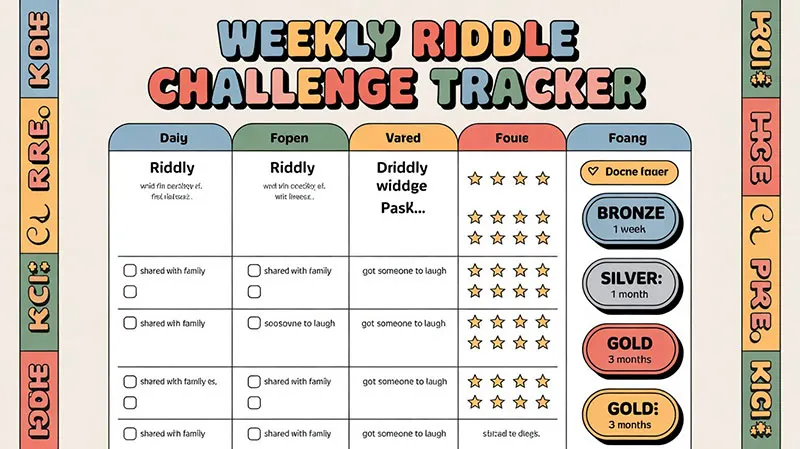
Keep sharing, laughing, and solving problems. Everyone around you and your brain will appreciate you!

